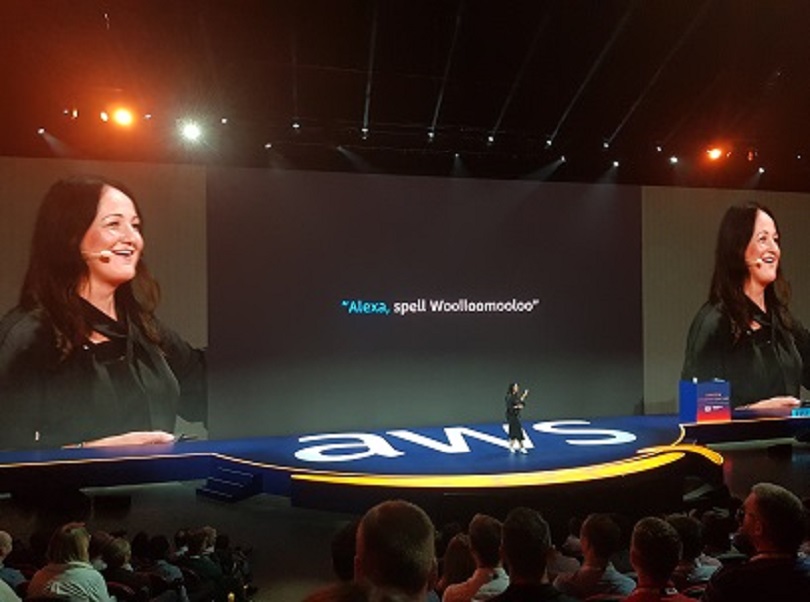The Alexa advantage? Amazon’s Aussie voice ambitions

The Australian market is approaching five months since Amazon launched its highly anticipated marketplace service, and by many accounts its entry hasn’t been all it was cracked up to be.
While Amazon has said that Australia brought in its highest launch day volumes in the company’s history, the overwhelming market response to its immediate impact has been a shrug and a sigh of relief.
In his second public appearance since taking the reigns of Amazon in Australia yesterday company veteran Rocco Braeuniger conceded that he and his team still have a lot of work to do as the business moves towards a launch of the Prime loyalty program locally.
“There’s still a long way to go,” he said. “We’re really working hard to bring a lot of innovation here.”
Braeuniger faces an interesting challenge. Amazon is estimated to account for more than 50 per cent of total e-commerce sales in the US, but the business is far from an early mover in the online or marketplace space in Australia – local retailers have had years to learn from the mistakes of their international peers.
But those trying to go toe-to-toe with Amazon’s e-commerce platform could be in for a surprise.
Earlier this year Amazon’s voice assistant Alexa launched locally with its suite of accompanying echo products to little fanfare, which is interesting given founder Jeff Bezos’ clear focus on the service.
“Our 2017 projections for Alexa were very optimistic, and we far exceeded them. We don’t see positive surprises of this magnitude very often — expect us to double down,” he said when Amazon reported fourth quarter earnings in February.
The Alexa advantage
Bezos isn’t the only one excited about Alexa either, Braeuniger has two Echo devices in his home and uses Alexa every day to do everything from getting the headlines to checking the surf at his local beach.
Despite only being a few months into its Australian life, Alexa has more than 15,000 ‘skills’ (applications) available on its platform, providing customers with voice access to movie tickets, pizza, news, public transport and banking.
A myriad of local brands is already on board, from Qantas to National Australia Bank, Domino’s and Hoyts.
In a presentation yesterday, Alexa’s recently hired managing director of Alexa skills in ANZ, former Intel Australia MD Kate Burleigh, said that voice interaction was a game changer that will take the Australian market by storm.
“It is the biggest leap forward we’ve seen in a number of years and we can do it now because its technically possible,” she told a crowd of thousands gathered in Sydney.
“Voice is how we like to interact, it’s the most natural way for all of us to communicate with each other … and bring our ideas to life.”
Alexa is an important part of Amazon’s end-to-end customer strategy in the US, embedding Amazon into the living rooms of consumers that have been turning to voice shopping in droves.
In Australia voice shopping is still relatively under-developed but is expected to take off in the next few years, with a recent survey conducted by Salmat finding that as many as 46 per cent of Aussies are excited to take voice shopping for a spin.
For Amazon it represents an opportunity to ground floor and catch many otherwise prepared Australian competitors off guard – Alexa could be the key to cementing its presence in the local market.

Alexa Skills ANZ MD Kate Burleigh shows off the brands already signed up with Alexa.
Competitors responding
Amazon’s closest local competitors are already responding though, with Ebay one upping its rival late last year by launching voice shopping in partnership with Google’s voice assistant. Amazon shopping is still not available to Australian Alexa users.
Meanwhile, Ruslan Kogan is looking to launch his range of own-branded smart speakers with Google Assistant built in and Catch Group is actively looking into the channel.
“Voice will be the future of search, there’s no doubt about that,” Catch’s head of marketing Ryan Gracie has said.
But for traders outside of the marketplace space voice is a tricky proposition. Voice lends itself to convenient product searches that are light on detail about things like brand or preferred seller, raising the possibility that Amazon, which also sells its own products, could gate-keep shopper queries.
Alexa in the home – completing the closed loop
Burleigh, who will be working on implementing Alexa’s voice shopping capabilities locally, didn’t delve into the details of Amazon’s plans on Tuesday, but outlined Amazon’s ambition to put the voice assistant at the heart of the Australian household.
“We’ve already had such excitement in the marketplace around the potential that Alexa can bring into our homes,” she said.
In the US, where Alexa now has more than 30,000 skills, large appliance businesses such as LG are embedding Alexa into their products.
“You can build your own devices and solutions and embed Alexa’s voice service,” Burleigh explained.
Aside from its hope that Alexa can become part of millions of Australian homes, it will also form a cornerstone of the infamous closed-loop model it has implemented in the US, synergising with its forthcoming Prime loyalty program by enabling exclusive deals for subscribers.
The highly anticipated loyalty program is expected to launch later this year and is expected to deliver a step-change for Amazon’s Australian plans as it expands its fulfilment capabilities here.
Comment Manually
You must be logged in to post a comment.

No comments